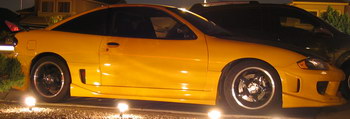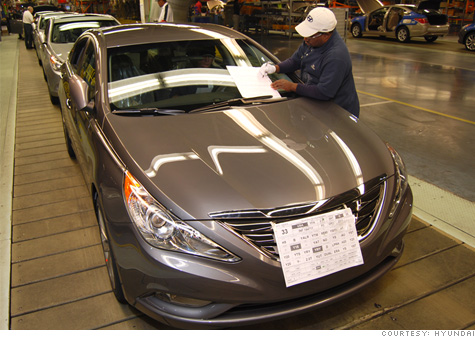Can we please not confuse assemble and Built?
Sure the cars are put together here, but were are the parts coming from? Seeing how assembly accounts for what? maybe 7% of the total cost of the vehicle, I don't see the big deal.
Ford may have moved assembly to south for cost reasons, but majority of the parts are still made in the US. and thats were all the cost is.
Providing jobs for American's during a hard time is a huge deal. Just here on the JBO look at all the people having a hard time finding a job. When they assemble the vehicle in the U.S. think of all the jobs that opens up. Sure, the profit still goes back to Korea. Thats making the rich even more rich. What the average working man like most of us benefits from the most though is the jobs it creates. More vehicles being assembled in the U.S. means more jobs here and more vehicles sold here. More vehicles sold here also creates more jobs for people selling the cars. Much is to be gained from it. The profit of the vehicle going back to where ever it may be is not even half of it.

Something to ponder: Companies with unfortunate heavy ties to the UAW move production out of the US. Companies with no ties to the UAW, and unions, build brand production facilities in the US.

FstCavZ24 wrote:Something to ponder: Companies with unfortunate heavy ties to the UAW move production out of the US. Companies with no ties to the UAW, and unions, build brand production facilities in the US.
Probably because they go overboard with the benefits. @!#$ the guy taking out the trash probably makes 15-20 dollars an hour with all paid holidays. You've got a guy thats been there for years and makes 25 dollars an hour but has become worth @!#$ and its nearly impossible to fire him.

While it's nice to provide American jobs (which is the least they can do if they are selling cars to Americans!), doing so does not remove the sting of knowing that the beneficiaries of the Hyundai's profits are not Americans. Hyundai's profits go back to Korea, to their primarily Korean shareholders and to the Korean government in the form of corporate taxes.
Myself, I'd prefer those Americans were buying American cars built by Americans, whereby the profit goes to American corporations, shareholders, and the American government. But that's just me. Same amount of jobs, just more of the money staying in America.
Bill Hahn Jr.
Hahn RaceCraft

World's Quickest and Fastest Street J-Bodies
Turbocharging GM FWD's since 1988
www.turbosystem.com
Oh, and the title of this thread (apparently a Hyundai statement) angers me as much as seeing Toyota bodies on nitro funny cars. I'm a tolerant man, but some thresholds do still exist for me!
Edited 1 time(s). Last edited Wednesday, October 27, 2010 4:48 AM
Bill Hahn Jr.
Hahn RaceCraft

World's Quickest and Fastest Street J-Bodies
Turbocharging GM FWD's since 1988
www.turbosystem.com
Bill Hahn Jr. wrote:While it's nice to provide American jobs (which is the least they can do if they are selling cars to Americans!), doing so does not remove the sting of knowing that the beneficiaries of the Hyundai's profits are not Americans. Hyundai's profits go back to Korea, to their primarily Korean shareholders and to the Korean government in the form of corporate taxes.
Myself, I'd prefer those Americans were buying American cars built by Americans, whereby the profit goes to American corporations, shareholders, and the American government. But that's just me. Same amount of jobs, just more of the money staying in America.
Ideally yes I agree, american money spent on american products where the money goes back to america and creates jobs for americans. However, realistically we know that foreign cars will always be sold here. They will continue to do well. So no matter what profit will be going back to a foreign country. At least this way were getting something out of the deal vs nothing.
This is coming from someone who drives an import. I don't drive an import because I love japanese cars and refuse to buy american. I bought an import because for the money I spent and what I was looking for no american cars did it for me. If I could have got an equal car that was American I would have chose it first. However, thats getting into an entirely different debate all together that we don't really need.

A small revelation for me last night.
I'm down to 2 cars that are on my list to buy. and i drove and sat and played with both of them all day on my day off. A 2011 Mustang GT and a Hyundai Genesis 3.8 track. I looked at the track and at $30,000 fully loaded that's a really hot deal. But then i found out something i didn't expect. When looking at V6 Mustangs I was shocked to find out that the 400+hp GT's cost $1000 less than the loaded V6 Hyundai.
Sure i was losing Torsen LSD, Brembro brakes, heated leather seats, power moon roof and that awesome warranty. But the base GT mustang is no joke power windows, mirrors, locks, A/C and that amazing 5.0 with a 6 speed is far to tempting at a lower price. It just made my decision that much harder. Which really got my head going, even with the UAW, how the hell does Ford do it? That's easily the best American car value in the world. The Mustang GT is proof that Domestic automakers can do it right.
 "Formerly known as Jammit - JBO member since 1998" JBOM | CSS.net
"Formerly known as Jammit - JBO member since 1998" JBOM | CSS.net
We're missing one major thing the article brings up... and it's not where it is assembled, which in this case is here. But the domestic parts content. In recent times the only manufacturer that had a high percentage of American made parts were the Saturn S-series at 90+%.
Today, you hardly see American manufacturer with passed 75% American content. Hell, even our beloved or lamented 3rd gen Js had manual transmissions made either in Japan or Italy. If Hyundai pulls of 80% American parts content and still be assembled here, it will be a kick in the balls to the American manufacturers that does not get their part supply from land it's from.
It's sad when you have Toyota's cars like the Camry (75% for 2009 model, 80% for 2010), Tundra (80% ) and Sienna (85% ) and in model year 2006, the Ford Mustang had 65% domestic content and the Chevrolet Suburban 67% as an example.
>>>For Sale? Clicky!<<<
-----The orginal Mr.Goodwrench on the JBO since 11/99-----


Bill Hahn Jr. wrote:While it's nice to provide American jobs (which is the least they can do if they are selling cars to Americans!), doing so does not remove the sting of knowing that the beneficiaries of the Hyundai's profits are not Americans. Hyundai's profits go back to Korea, to their primarily Korean shareholders and to the Korean government in the form of corporate taxes.
Myself, I'd prefer those Americans were buying American cars built by Americans, whereby the profit goes to American corporations, shareholders, and the American government. But that's just me. Same amount of jobs, just more of the money staying in America.
American Corporation!?
Are you joking? You seriously think that corporations that large give two @!#$s about America? The only time they care about America is when they are getting bailed out. If you can buy stock in them they are
International[/b corporations. Let's not kid ourselves here, in a free global market there's no room for nationalism to exist within a corporation.

Hahn Stage II - Mitsu TD06-20g |3" Turbo-back Exhaust | 61mm Bored TB |
HP Tuners | Innovate WB02 | Spec Stage 3 | Team Green LSD | TurboTech Upper | Full Addco Sways | Sportlines & Yellows |
It's jobs in the US where jobs are needed.

Jookycola wrote:A small revelation for me last night...The Mustang GT is proof that Domestic automakers can do it right.
And they can. And they now do! Years of ill decision making are now long gone, and a very bright future awaits...IF we can avoid making purchase decisions based on whitewashes like this Hyundai statement of "more American."
BlackEco wrote:American Corporation!?
Are you joking? You seriously think that corporations that large give two @!#$s about America? The only time they care about America is when they are getting bailed out. If you can buy stock in them they are International corporations. Let's not kid ourselves here, in a free global market there's no room for nationalism to exist within a corporation.
I would not reduce it to actual nationalism...that's like saying that because I favor protecting my own family, and my family is white, that I am therefore guilty of racism. My motivations for wishing to protect American interests are borne more of self-preservation than national pride or a dislike of other nations. Frankly, I am more far tolerant of other nations and their perceptions than the average American. That doesn't mean I feel compelled to put their interests above my own.
No, it remains true that spending money with American companies benefits Americans more than spending it with foreign companies. You can argue how
much more, but I don't believe you can completely refute this statement.
GTmatters wrote:It's jobs in the US where jobs are needed.
The jobs would still be here if the cars being sold were from American companies.
Folks, we can rationalize and attempt to justify the decision to spend money overseas all we want, but no matter what...when we do so, we benefit other nations more, and ours less. Until the world has a truly global economy, where every won* or euro or dollar spent benefits every inhabitant of the earth equally, this statement remains true. I think we are a long way from that.
won*: Korean currency
Bill Hahn Jr.
Hahn RaceCraft

World's Quickest and Fastest Street J-Bodies
Turbocharging GM FWD's since 1988
www.turbosystem.com
I believe in freedom. It's what makes this country the best place on earth to live. We are free to live our lives and make our own decisions. I also believe in freedom of choice and competition. We all work hard for what we have so we should be able to buy whatever we want.
Detroit pissed on the consumer with poor product and even worse customer service. That left door wide open for imports to welcome people to their products. They did this to themselves. The products may be great now but now they screwed themselves and have to convince people they are better. But if a Korean car maker can prove they are more American that's a poor showing for domestic companies trying to wave the u.s. flag and guilt.
 "Formerly known as Jammit - JBO member since 1998" JBOM | CSS.net
"Formerly known as Jammit - JBO member since 1998" JBOM | CSS.net
jesus H christ, what a @!#$ joke

1989 Turbo Trans Am #82, 2007 Cobalt SS G85
Jookycola wrote:I believe in freedom. It's what makes this country the best place on earth to live. We are free to live our lives and make our own decisions. I also believe in freedom of choice and competition. We all work hard for what we have so we should be able to buy whatever we want.
Detroit pissed on the consumer with poor product and even worse customer service. That left door wide open for imports to welcome people to their products. They did this to themselves. The products may be great now but now they screwed themselves and have to convince people they are better. But if a Korean car maker can prove they are more American that's a poor showing for domestic companies trying to wave the u.s. flag and guilt.
I also believe in freedom of choice, as a consumer. I will not abandon US car companies for past sins. Adaptation is an admirable trait, and coming from behind to catch up and re-join the front of the pack is a Herculean task...and they pulled it off.
While other nations' automobile industries have folded under into oblivion (Britain is a good example), ours have managed to make an extreme turnaround against horrific odds. I am very proud of them, and I feel they have demonstrated values we as Americans hold very dear...determination, fortitude, and best of all...victory over overwhelming odds.
As for me, I really don't care HOW much American-sourced content is in a Korean-owned company's automobile...the title of this thread will always offend me. I believe statements like this will do them more bad than good in the long run. They can NEVER be "more American" than an American company.
Bill Hahn Jr.
Hahn RaceCraft

World's Quickest and Fastest Street J-Bodies
Turbocharging GM FWD's since 1988
www.turbosystem.com
Bill, not trying to be an ass but its almost like they finally got your medication back in stock. I agree with a lot of what you say and even the ones I don't agree with are at least good points and well thought out. Hats off....

Bill i can agree, i wish they were built and assembled here, but obviously thats not going to be that way. I was just saying it is most definately better than having no part of the foreign car industry here.

Bill Hahn Jr. wrote:Jookycola wrote:I believe in freedom. It's what makes this country the best place on earth to live. We are free to live our lives and make our own decisions. I also believe in freedom of choice and competition. We all work hard for what we have so we should be able to buy whatever we want.
Detroit pissed on the consumer with poor product and even worse customer service. That left door wide open for imports to welcome people to their products. They did this to themselves. The products may be great now but now they screwed themselves and have to convince people they are better. But if a Korean car maker can prove they are more American that's a poor showing for domestic companies trying to wave the u.s. flag and guilt.
I also believe in freedom of choice, as a consumer. I will not abandon US car companies for past sins. Adaptation is an admirable trait, and coming from behind to catch up and re-join the front of the pack is a Herculean task...and they pulled it off.
While other nations' automobile industries have folded under into oblivion (Britain is a good example), ours have managed to make an extreme turnaround against horrific odds. I am very proud of them, and I feel they have demonstrated values we as Americans hold very dear...determination, fortitude, and best of all...victory over overwhelming odds.
As for me, I really don't care HOW much American-sourced content is in a Korean-owned company's automobile...the title of this thread will always offend me. I believe statements like this will do them more bad than good in the long run. They can NEVER be "more American" than an American company.
You don't get it. GM is not an "American" car company. They are an international corporation owned by interests all over the world. The only thing that makes them American now is that tax payers have been forced to buy into their equity. I would expect nothing short of an "amazing" turn around given all corporate welfare which has been shelled out to these "American" companies. Socializing international debt, there is a real
American value for you!

Hahn Stage II - Mitsu TD06-20g |3" Turbo-back Exhaust | 61mm Bored TB |
HP Tuners | Innovate WB02 | Spec Stage 3 | Team Green LSD | TurboTech Upper | Full Addco Sways | Sportlines & Yellows |
BlackEco wrote:Bill Hahn Jr. wrote:Jookycola wrote:I believe in freedom. It's what makes this country the best place on earth to live. We are free to live our lives and make our own decisions. I also believe in freedom of choice and competition. We all work hard for what we have so we should be able to buy whatever we want.
Detroit pissed on the consumer with poor product and even worse customer service. That left door wide open for imports to welcome people to their products. They did this to themselves. The products may be great now but now they screwed themselves and have to convince people they are better. But if a Korean car maker can prove they are more American that's a poor showing for domestic companies trying to wave the u.s. flag and guilt.
I also believe in freedom of choice, as a consumer. I will not abandon US car companies for past sins. Adaptation is an admirable trait, and coming from behind to catch up and re-join the front of the pack is a Herculean task...and they pulled it off.
While other nations' automobile industries have folded under into oblivion (Britain is a good example), ours have managed to make an extreme turnaround against horrific odds. I am very proud of them, and I feel they have demonstrated values we as Americans hold very dear...determination, fortitude, and best of all...victory over overwhelming odds.
As for me, I really don't care HOW much American-sourced content is in a Korean-owned company's automobile...the title of this thread will always offend me. I believe statements like this will do them more bad than good in the long run. They can NEVER be "more American" than an American company.
You don't get it. GM is not an "American" car company. They are an international corporation owned by interests all over the world. The only thing that makes them American now is that tax payers have been forced to buy into their equity. I would expect nothing short of an "amazing" turn around given all corporate welfare which has been shelled out to these "American" companies. Socializing international debt, there is a real American value for you!
Oh, I get quite a lot! I can tell that recent events have left a bad taste in your mouth, and you're not going to come around to supporting GM. So be it.
GM remains an American company, with majority American ownership. Many Americans still take pride in our auto industry, even in its current form. I feel it was worth preventing its total collapse.
I do not share your jaundiced eye towards GM, and I stand by my statements. Call me an optimist, even a pragmatist! As an aside, I sense a political moment coming on in your demeanor, and I invite you to the forum devoted to such if you'd like to feed it.
Bill Hahn Jr.
Hahn RaceCraft

World's Quickest and Fastest Street J-Bodies
Turbocharging GM FWD's since 1988
www.turbosystem.com
In before this thread blows up!




























